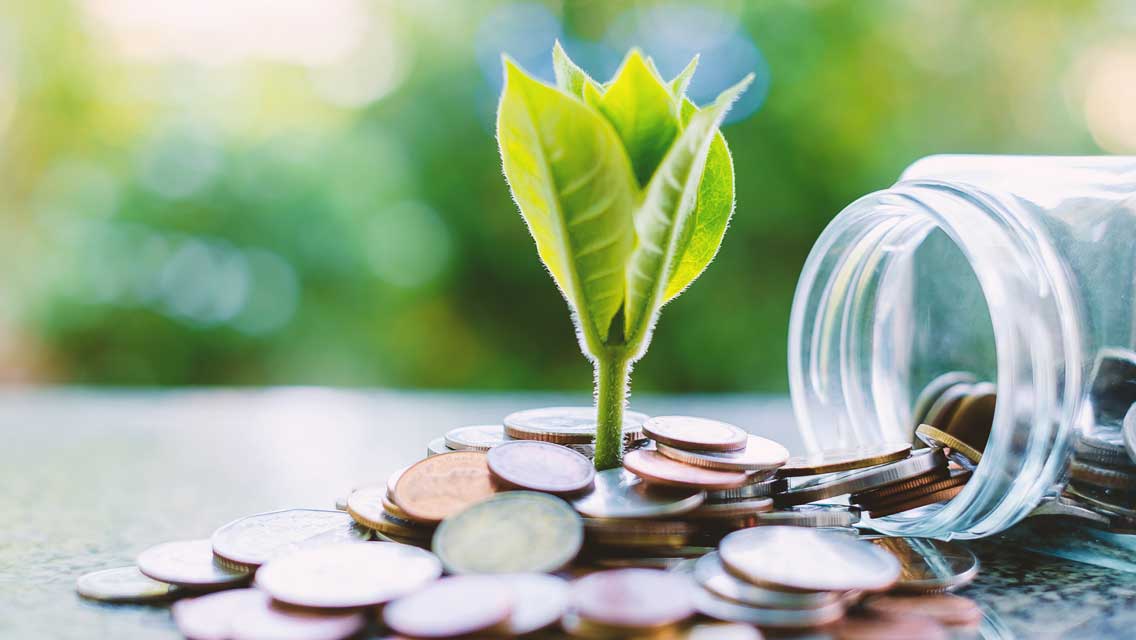Concerned about climate change? You’ve perhaps already reduced the red meat in your diet. You recycle and avoid single-use plastic. You try to walk, bicycle, or use public transportation when possible.
But did you know your bank account and your investments may also be contributing to the climate crisis?
Where your money goes matters. Your banking and investment choices play a role not only in your personal financial future, but also in the health of the planet.
Funding Negative Change
Banks generate income by using your money to make loans and investments. And many major financial institutions may be leveraging your deposits in a way that slows our transition to more sustainable resources.
For instance, since 2016, the global banking industry has invested trillions of customers’ dollars into the fossil-fuel industry, according to Banking on Climate Chaos: Fossil Fuel Finance Report 2022. Authored by the Rainforest Action Network, BankTrack, Indigenous Environmental Network, Oil Change International, Reclaim Finance, the Sierra Club, and Urgewald, the study found that the 60 largest banks invested more than $4.5 trillion in fossil fuels during the six years since the 2015 Paris Agreement. This international treaty was designed to guide governments’ environmental strategies and reduce greenhouse gases that contribute to global warming.
“Banks make voluntary choices about where their power is distributed, and most major fossil-fuel-infrastructure-expansion projects couldn’t happen without the support of bank financing.”
“It’s highly profitable to finance fossil fuels and bank on some of the worst climate and human-rights offenders,” says Lucie Pinson, founder of environmental watchdog Reclaim Finance.
All corporations — including banks — are bound by fiduciary responsibilities to serve their shareholders, and that’s why they invest the way they do.
“Banks make voluntary choices about where their power is distributed, and most major fossil-fuel-infrastructure-expansion projects couldn’t happen without the support of bank financing,” says Rainforest Action Network spokesperson Laurel Sutherlin.
But this also means you can make choices about where you deposit and invest your money.
Better Banking
“Sustainable investing” is a catchall for environment, social, and governance investing (ESG), explains Brent Kessel, CFP, cofounder and financial advisor of the sustainable-investment firm Abacus Wealth Partners. Sustainable banking, a subset of sustainable investing, focuses on financing green infrastructure projects to help counter the climate crisis.
Sustainable banks direct funds toward renewable energy, sustainable agriculture, and other green initiatives. These financial institutions consider these elements part of their strategic planning efforts and regular banking activities. It’s part of their mission, and their customers support their broad environmental and social goals.
When you invest in eco-friendly companies, your money has the power to do good.
Amalgamated Bank, for instance, has operated as a mission-driven institution for about a century, but beginning in the 2000s, its board of directors began to focus on environmental, social, and corporate practices.
Amalgamated was the first American bank to divest from carbon risks across its lending and investment holdings. The bank is also a certified B Corporation, meaning it’s verified by the nonprofit B Lab to meet “standards of social and environmental performance, transparency, and accountability.”
Aspiration, a B Corp carbon-removal company, offers a sustainable cash-management account (and an eco-friendly debit card partially made from upcycled ocean-bound plastic). Every time you make a purchase with the firm’s debit card and round up to the nearest dollar, the company adds that change to its tree-planting fund; to date, it has planted more than 125 million trees. If you purchase gas for your vehicle with the Planet Protection program, Aspiration automatically purchases carbon offsets.
Investing in the Future
When you invest in eco-friendly companies, your money has the power to do good. Similar to how a bank uses your deposits, publicly traded corporations use shareholders’ investments to capitalize projects.
“Aligning values around the environment and people with investments in the stock market, bond market, and 401(k)s can change corporate behavior and provide capital that may help the planet rather than hurting it,” Kessel says. “Find investment managers or advisors who can help your money have a voice. Your investments can exert influence.”
“Aligning values around the environment and people with investments in the stock market, bond market, and 401(k)s can change corporate behavior and provide capital that may help the planet rather than hurting it.”
He recommends that investors use the framework developed by the Impact Management Project, an investment-watchdog collaboration. Part of the framework includes looking at investments through an ABC lens: A is to avoid harm, B is to benefit stakeholders, and C is to contribute to solutions.
Some specific investment options include the following:
- Socially responsible investing (SRI) typically means that the accounts divest from companies that are considered to be doing harm to the environment and society. “Evaluating the possible environmental and social risks of a company should be part of every investment manager’s risk-mitigation analysis, in my opinion,” Kessel argues. “A couple of common examples include avoiding private prisons or a company that has a nebulous environmental track record.”
- ESG investments or impact investments may include SRI divestment but also a focus on funding projects that contribute to a positive environmental or social impact. These might include renewable-energy and affordable-housing projects, but your investment managers may also urge public companies on your behalf to become better corporate citizens.
“We tell our clients not to do ESG investing because they expect higher financial returns but rather to expect similar financial returns and positive impact returns — such as making the world a better place,” Kessel explains. “The ROI [return on investment] isn’t just about investments financially, but also the impact that you’re making on the globe with your investing.”
You can look for mutual funds and exchange-traded funds (ETFs) whose stock portfolios have been screened to meet ESG criteria. These may include avoiding investments in fossil fuels; allocating money to ESG companies; and supporting investment managers who engage with corporations.
- Green bonds typically “use their proceeds to help the environment, such as a renewable-energy infrastructure project,” Kessel explains. Green bonds usually carry a fixed interest rate and a defined maturity date, allowing investors to earn a return on their investments. In 2021, firms issued $621 billion worth of green bonds.
“By investing in green bonds that are supporting wind, solar, and other renewable-infrastructure projects,” he notes, “you’re likely helping reduce the greenhouse-gas emissions of traditional energy sources while targeting similar expected returns as traditional investing.”
What You Can Do Now
Sustainable banking and investing have the potential to create a more equitable and socially conscious financial system by addressing environmental degradation through investments that prioritize environmental conservation and other social-justice issues. These are some of the actions you can take.
- Research banks and investment options that align with your values. Don’t just settle for convenience or fall for golden-hued advertising. Consider locally owned banks or credit unions that also invest in your neighborhood.
- Favor banks and investments that fund social and environmental impact, including renewable energy, and avoid companies that contribute to climate change.
- Look for banks that are members of the Global Alliance for Banking on Values, a network of independent banks devoted to sustainable economic, social, and environmental development.
- When looking at new investments, the Forum for Sustainable and Responsible Investment’s website is a helpful source of background information.
- To evaluate your current investments, consider services, such as YourStake.org and FossilFreeFunds.org, that help analyze thousands of mutual funds and ETFs.
- Make your views heard: Remember that by depositing or investing, you become a shareholder. Engage with your bank, investment advisor, 401(k) provider, and the management of companies you invest in on environmental or social issues that you care about.
This article originally appeared as “Greener Money” in the September/October 2023 issue of Experience Life.





This Post Has 0 Comments